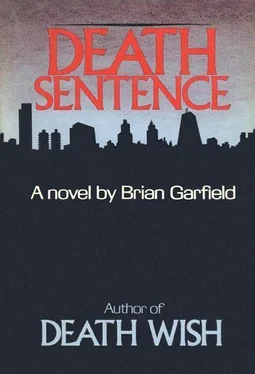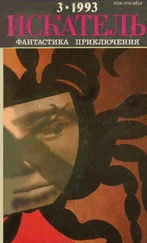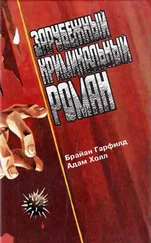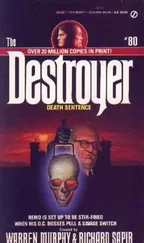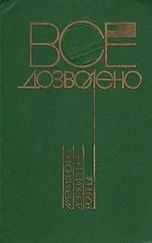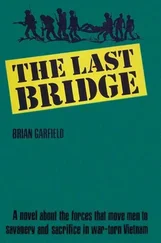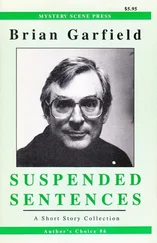“No sir, I can see that all right.”
“Thanks again.” Paul went back to his car.
In the library he looked up Orson Pyne in the university catalogue. Pyne was forty-seven, an assistant professor in the Physics Department. He had a B.S. from the University of Oklahoma, an M.S. from Cal Tech and a Ph.D. from Northwestern, the latter acquired in 1968. He was one of the five authors of a basic physics textbook used by freshmen. He had served in the Navy from 1947 to 1953. A four-year hitch extended by the Korean War, evidently. There wasn’t anything else about him. Paul tried various editions of Who’s Who but Pyne wasn’t listed in any of them.
He drove back to Reba Place and staked himself out a few doors away from Pyne’s house. He still didn’t know that he’d found his man; it seemed too easy; as the afternoon dragged by he thought of all the possibilities and was ready to conclude it was a blind alley. Truett’s .45 Luger hadn’t been the only one in the world. And it seemed too coincidental to be possible that both vigilantes had armed themselves from the same gun shop. Truett’s was one of a hundred gun shops beyond the state line and it didn’t advertise in the Chicago papers.
But the .45 Luger, if not unique, was very rare and he remembered something Truett had said that first time he’d been there: Far as I know this is the only one like it this side of Los Angeles. Even if he’d been exaggerating its rarity it still made Orson Pyne a possibility...
Factors for-and-against kept warring in his mind but in the end he knew it didn’t matter; Pyne was the only lead he had. If it turned out Pyne wasn’t the second vigilante then he had nothing else to try. He’d have to give it up. He’d had one piece of information the police hadn’t had — Truett and the Luger — and since it was the only advantage he had, he was pressing it. There was no point worrying now about whether it would pay off.
Five o’clock went by before the green Ambassador turned into the driveway. It stopped there, not proceeding back to the carport, and on that evidence Paul suspected Pyne intended to go out again. From his car he watched the man emerge from the car and walk up the porch steps. A tall man, lean with a scholar’s stoop; dark hair combed sidewise across the high forehead; a thin face, almost a satyr’s face. His appearance was hardly sinister.
But then neither is mine.
Full darkness came only a few minute later. Lights came on in the back of the house — the kitchen? The front windows remained dark. Paul slipped on his rubber gloves and opened the dimestore package of fluorescent red tape. He tore off two arm’s-length strips of it and quietly left his car trailing the gummed tape from his fingertips.
Down the block a car arrived home and Paul waited until its driver parked and went inside a house. Then he walked to Pyne’s car and swiftly pressed the tape across the rear bumper. He straightened and went directly back to his own car. The fluorescent tape would make it easier to follow Pyne at a distance in the night; Pyne probably wouldn’t notice it and even if he did there was no harm in it for Paul.
At seven a man came out of Pyne’s door and descended the steps. At first Paul was confused. The man had pale hair — grey or blond — and a long pale mustache. Then he realized it was Pyne in wig and false whiskers. It made him smile a bit. Pyne backed the Ambassador out of the driveway and rolled toward Paul. When the Ambassador had disappeared at the corner by the filling station, Paul made a quick U-turn and followed.
It was easy tailing the bright strip of red tape. He hung back more than a block, letting traffic intervene. Was it going to be this easy?
There was a shopping center on the right and the Ambassador turned into its parking lot. Paul slowed as he went past, and cramped the car into the second entrance to the lot. He cruised through the lanes — most of the stores were still open and there were hundreds of cars.
Pyne had pulled into a slot at the far end of the lot. Paul reached the end of a row, went around the parked cars and started slowly up the next row; through the glass of the cars he watched Pyne. The tall man got out of the Ambassador and locked it. Did he have some secret knowledge of a crime planned here in this parking lot?
Then Pyne went into his pocket and brought something out. It was too small to be visible; certainly not a gun. He walked across the aisle between parking rows and looked all around him. Paul turned and came driving toward him down the aisle. Pyne stooped, fitting his key into the lock of a battered old car.
He’s changing cars.
How brilliant, he thought. It’s something I should have thought of.
It was at least ten years old — the kind of car you could buy for a hundred dollars cash with no questions asked. A phony name, a phony address. Untraceable.
Pyne was backing the old car out. Paul gave it close scrutiny as he drove past. It was pocked with dents and rust stains; it squatted low on its springs. It was a four-door Impala; it had once been blue but had faded toward grey. It had a Wisconsin plate. He recognized the deep treads of the snow tires: Pyne wasn’t taking chances on getting stuck. Probably the car was in much better mechanical shape than the exterior implied; Pyne was a physicist, he’d have a respect for mechanical things and an awareness of the need for maintenance to ensure reliability. But it was a sure thing he didn’t have it serviced in that filling station where he took the Ambassador.
Well of course he was clever. He’d have been caught long ago otherwise.
But if that was the case why had he used his own name and address when he’d bought the Luger from Truett? And why the Luger at all, since it was so rare and easily identifiable?
It was a question to which he couldn’t provide an answer out of pure speculation. Possibly when Pyne had bought the gun he hadn’t had vigilantism in mind; perhaps that had come afterward. There were a lot of ifs and none of them really mattered; the only thing that mattered was the answer to one question: was Pyne the other Vigilante?
He knew how to force Pyne to cease his raids. But he couldn’t confront Pyne until he was absolutely certain Pyne was the right man. Confront an innocent man and the whole thing could backfire in his face: an innocent man would have no reason not to turn Paul in to the police. Only the second vigilante could be counted on to keep Paul’s secret.
He followed the Impala south into Chicago.
He saw another reason why Pyne had chosen the dilapidated old car: it blended into the neighborhoods Pyne liked to prowl. Nobody was likely to mistake it for an unmarked official car.
It fascinated him to watch the way Pyne worked: it was as if he himself had trained the man. Pyne tried twice to entice muggers to follow him out of night-service pawnshops on the South Side. When that failed he parked the car on a side street and went into a bar and fifteen minutes later came stumbling out, patently drunk, and went wandering in search of his car. No one trailed him. Pyne was perfectly sober when he got in the car and drove away.
Paul gave him a one-block lead.
In the back streets of the ghetto Pyne drove at a crawl, searching the shadows. Paul had to take risks, veering away and driving around a block and waiting for Pyne to go by in front of him; otherwise Pyne would have realized a car was dogging him. He seemed preoccupied with his own hunt and Paul saw no indication that he was worried about surveillance but there was no point making his presence obvious.
Paul reached under the car seat. He pulled out both of his guns; slipped the Centennial in his right coat pocket and the .25 automatic in his left. He had to get rid of them tonight. He had the cleaning kit under the seat as well. He knew where he’s get rid of them, on his way home.
Читать дальше
